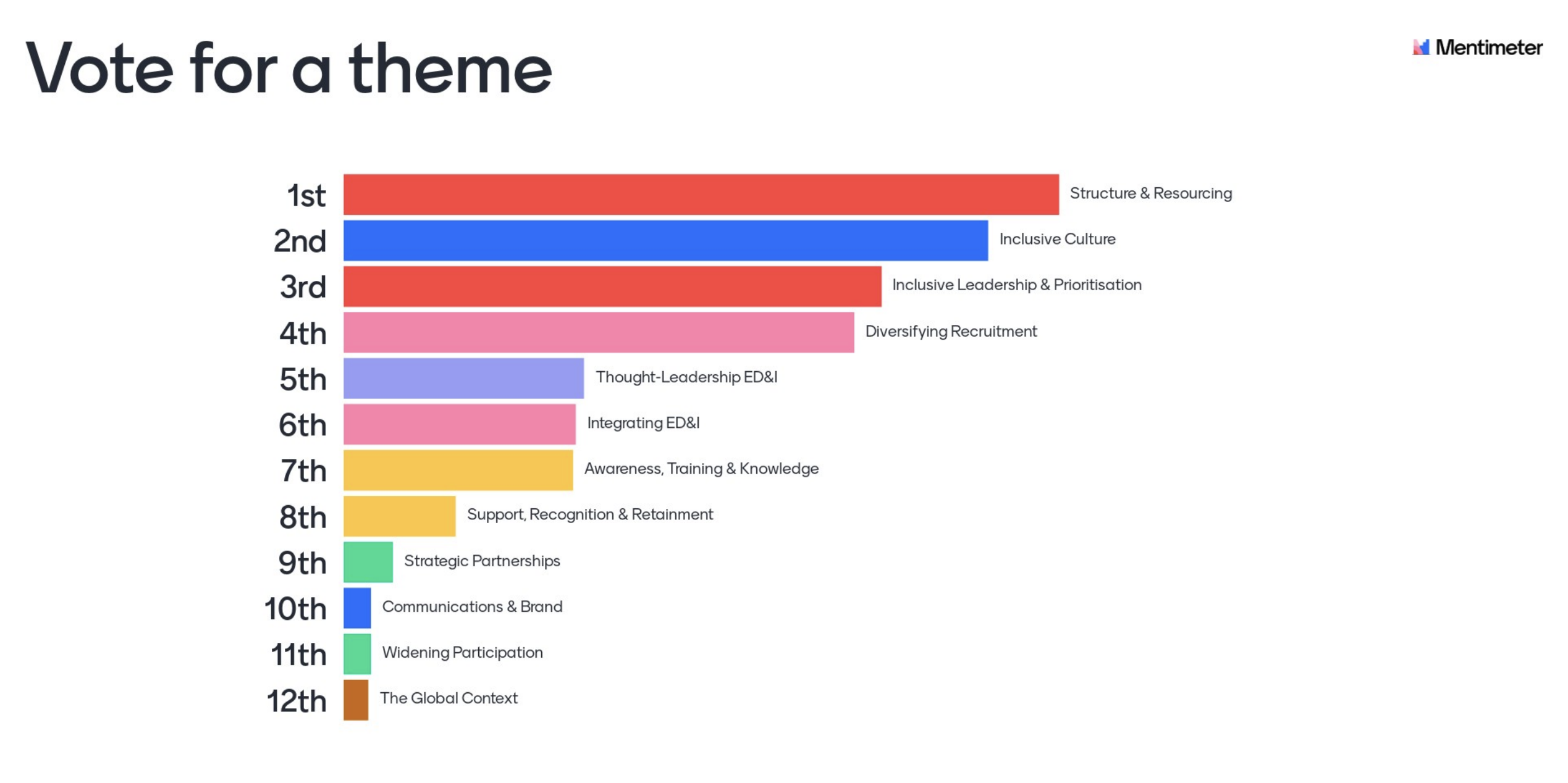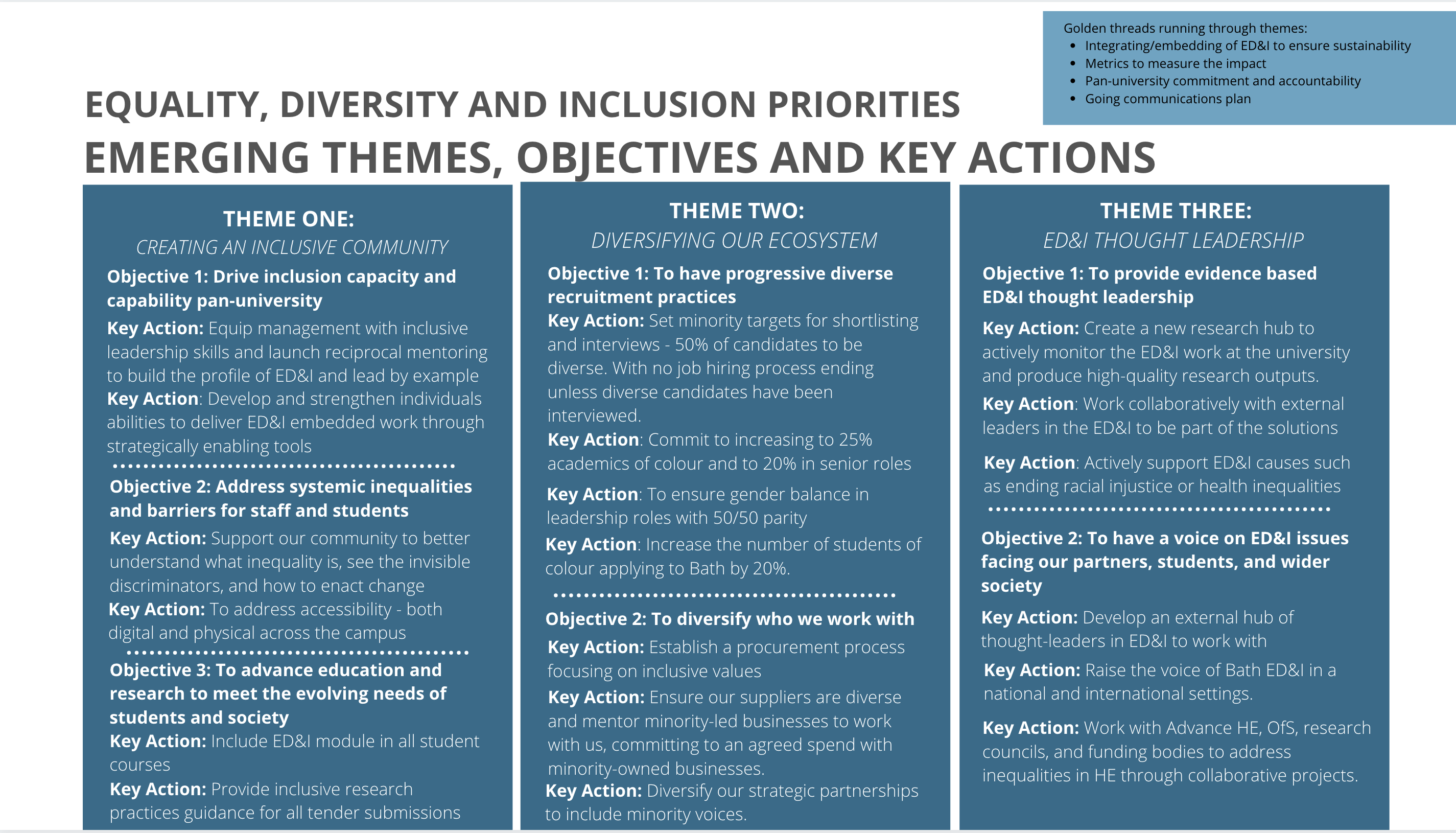Our roadmap to inclusion is taking shape thanks to you
Introduction
Addressing inequalities, and promoting greater understanding and inclusion continues to be one of the key challenges that we face as part of a global society. Over the last three years, the University has grown to recognise the need for a more formal approach to equality, diversity, and inclusion. This has provided the opportunity for a thorough consultation with our students, staff, and external partners, and analysis of our institutional data and strategic vision, to develop a collegiate and pan-university strategic plan for equality, diversity, and inclusion for 2021 – 2025.
This has included two workshops developed by myself, as Head of ED&I and an external consultant, Kamaljit Poonia, which brought together over 70 internal stakeholders providing the perfect opportunity to discuss the key themes, objectives, and actions required. We can’t thank those individuals enough for giving up their time to help shape the future of such an important issue. Sessions were designed and co-facilitated by myself and Kamaljit. The themes that have emerged have revolved around creating an inclusive community, diversifying our ecosystem, and providing thought-leadership for ED&I, and will require a real prioritising of ED&I, and commitment to change.
The pan-university approach to delivering and embedding this change requires a change framework programme as a vehicle to drive this forward, as well as the upskilling, capacity and capability building of the university community. This can be achieved through the central ED&I team bringing together change agents within departments in the form of subject specialists, operational leads, and academic experts committed to enabling everyone at the university to flourish and belong. Combined with the further development of the ED&I resource hub with strategically enabling tools, resources, guides, and training materials, this approach will enable a measurable change that will impact our internal experience, external reputation and aid our future resilience and relevance in a global setting.
A university's role is primarily to increase understanding, through education, research and empowering our students to be successful global citizens. Cognitive diversity and unique perspectives are essential to develop ideas, enable innovation, and permit creative discussions. This strategy is at the heart of inclusive learning, an inclusive environment, inclusive research, and the effect we have on the wider society as a global university.
WORKSHOPS OVERVIEW
The two workshops took place on the 5th and 12th of May 2021. Each workshop invited a range of stakeholders from both student and staff roles, academic and professional services, and from within our ED&I community. Within this group were individuals who reviewed our institutional data, and experts within our existing and future commitments under the University’s Access and Participation Plan, Athena Swan Charter, Race Equality Charter, Disability Committed Employer Status, and Stonewall Equality Index.
In addition, those who had reviewed the previous equality objectives 2018 - 2021 impact and our duties under the Equality Act 2010 to promote across the protected characteristics of age, disability, gender reassignment, pregnancy and maternity, race, religion and belief, sex and sexual orientation were present.
Individuals who work in close contact with Advance HE, OfS, and research councils were also present to ensure their future vision and requirements could be taken into consideration. As well as members of Council and Senate.
To supplement these internal voices, we also invited external competitors, allies and partners to take part in the session. Forming a panel that provided excellent insight, advice on the importance of an ED&I strategy, and partnership opportunities. These included:
- Professor Stephen Curry – Provost ED&I Imperial College London
- Leyla Okhai – ED&I Practitioner; Former Head of ED&I Imperial College London; UCL Lead on Black Mentoring Programme and Council Member for Leeds University
- Louise Murphy – Equalities Officer at BANES Council
Our Vice-Chancellor, Professor Ian White attended, and spoke about the importance of ED&I and its relevance to the emerging university strategy. Sharing his personal support for ED&I as a strategic pillar for the University.
The focus of day one was on:
- The role of the central ED&I team and our shared responsibility to achieving inclusion;
- The ED&I maturity model and our road to integrated and sustained inclusion;
- Responding proactively to a changing environment;
- Our resilience and relevance in the future and ED&I’s role in that;
- Creating a culture of curiosity and trust to enable diversity to thrive;
- And how our key ED&I strategic priorities intersect with our institutional strategic pillars.
Participants were provided with homework to identify their ED&I priorities and discuss them with their departments.
The second session focused more on our ED&I priorities and the outputs from day one. I asked participants to provide me with their desired themes and priorities for ED&I, I collated these and presented a shared vision of the primary themes extracted from their feedback. Every participant was asked to share one commitment they would make at a personal level to change or a rule they would live to aid inclusion. In break-out rooms and through voting the top priorities for the participants were identified.
Day One: 5th May 2021 Day Two: 12th May 2021
Note: The links above will take you to the workshop presentations including feedback from participants.
You can watch recordings of the workshops using the links below.
EMERGING THEMES, OBJECTIVES, AND KEY ACTIONS
The workshops allowed the university community to identify their priority themes for ED&I to focus on. Feedback resulted in twelve themes. These themes and underpinning objectives were then discussed in break-out rooms, and feedback to the larger group, to identifying potential objectives and blending of the themes. Finally, these were then voted on, the results can be found in the visual below.
 There are a number of themes within this that were not appropriate for strategic priorities but would prove necessary to achieve them or would run like a golden thread throughout all of the themes. These are discussed in more detail below.
There are a number of themes within this that were not appropriate for strategic priorities but would prove necessary to achieve them or would run like a golden thread throughout all of the themes. These are discussed in more detail below.
The process of considering the themes, objectives, and key actions is ongoing, however, the emerging outline is detailed in the visual below. It must be stressed these are DRAFT and still being developed.

UNDERPINNING THE THEMES
There were three distinct areas that the workshop participants identified as important to ensure that the institutional ambitions for the key pillar of ‘fostering an outstanding and inclusive community’ were met, as well as supporting the other pillars ‘driving excellence in education', ‘driving high impact research’ and ‘enhancing strategic partnerships’, these were:
- Integrating ED&I into the fabric of the University
- Inclusive leadership and prioritisation by the leadership team
- Structure and resourcing of ED&I
The final key actions will include measurable outcomes that will involve the sustainability of the work through embedding into existing structures, as well as who is accountable to lead on the delivery of these objectives. This will of course require the tangible backing of leadership, Council, UEB, and ED⁣ and appropriate resourcing to operationalise this vision. This could involve a number of methods, such as looking at the workload allocation for identified change agents in each department and providing them with ED&I dedicated time, thus helping in the decentralisation of the ED&I workload pan-university through a network of ED&I practitioners in departments. And the resourcing of the central ED&I team to ensure that these agents of change are provided with the necessary skills, tools, knowledge and support to achieve against these objectives, as well as drive the strategy, and continue to deliver against our Athena Swan, Race Equality Charter, and Stonewall action plans.
NEXT STEPS
In order to close the feedback loop, we want to test these proposed themes, objectives, and key actions with stakeholder groups. So I invite feedback, please email diversity@bath.ac.uk with your thoughts.
I would also like to host virtual focus groups with the SU and EDN. We would then take the final objectives through ED&IC for any final amendments before presenting them to UEB, Council and Senate for their approval. It is estimated that the final strategy will be signed off by Council in October 2021.
Thank you all once again for your excellent contributions.
Georgina Brown. Head of Equality, Diversity and Inclusion
Respond
